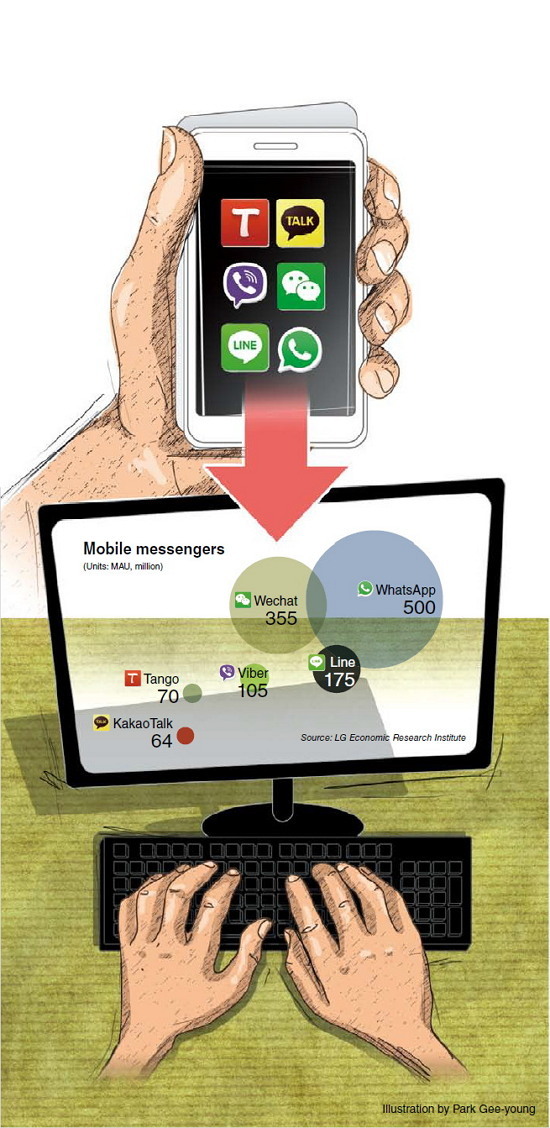Mobile messengers have been all the rage ever since the advent of smartphones while PC messengers, on the other hand, have gone downhill. South Korean mobile messenger operators, however, are turning to PCs to complement their existing mobile services and generate additional profit.
VCNC, which operates Between, a mobile messenger for couples, is the latest South Korean mobile messenger firm to roll out a PC version of a mobile messaging app.
“The PC application aims to capture the eight-hour period which couples spend in front of desktops at work,” said Park Jae-uk, CEO and cofounder of VCNC, in a press release after launching the Between app for PCs in October.
“The launch of the instant messenger for PCs will help couples communicate with each other across the different platforms,” he added.
In a beta test conducted in September with 5,000 Between users, the daily use of the messenger users saw a 85 percent increase thanks to the PC messenger, according to VCNC.
The results of the test also showed that from 8 a.m. to 6 p.m. the Between couples used the messenger via PCs almost twice as often as via smartphones.
Before and after those hours, on the other hand, the participants tended to use the mobile messenger more often than the PC counterpart.
Daum Kakao and Naver, the top two mobile messenger operators here, also run PC versions of their mobile apps KakaoTalk and Line, respectively.

Many office workers opt for the PC messengers when chatting with their friends on the app so that their bosses do not get the impression that they are loafing.
Launched in 2013, KakaoTalk for PC currently has around 29 million subscribers, which accounts for 18 percent of the app’s total subscribers.
“Daum Kakao expects the two services in the different platforms to create a synergy effect,” said an official from Daum Kakao.
Naver, a relative underdog against Daum Kakao in the domestic mobile messenger market, saw the importance of the PC messenger business earlier than other rivals as it launched Line for PC in 2012.
The PC messenger has a range of features including an online payment service, currently only available in Japan, which enables users to purchase goods online and offline, to transfer money to other users and withdraw money from bank accounts connected to Line’s mobile accounts.
Despite the recent migration of the heavyweights to the PC realm, tight-budgeted startups in the mobile messenger market are holding out against jumping on the bandwagon. They would rather try to beef up their existing services than pour resources into new ones.
“The odds are low that other players will catch up to KakaoTalk or Line in PC services so we are trying to strengthen security for mobile services, which has come under attention in recent days,” said Sun Woo-yoon, a spokesperson for Brinicle, operator of the mobile SNS service DonTalk.
By Kim Young-won (wone0102@heraldcorp.com)
VCNC, which operates Between, a mobile messenger for couples, is the latest South Korean mobile messenger firm to roll out a PC version of a mobile messaging app.
“The PC application aims to capture the eight-hour period which couples spend in front of desktops at work,” said Park Jae-uk, CEO and cofounder of VCNC, in a press release after launching the Between app for PCs in October.
 |
| The PC version of Between, a mobile messenger for couples (VCNC) |
“The launch of the instant messenger for PCs will help couples communicate with each other across the different platforms,” he added.
In a beta test conducted in September with 5,000 Between users, the daily use of the messenger users saw a 85 percent increase thanks to the PC messenger, according to VCNC.
The results of the test also showed that from 8 a.m. to 6 p.m. the Between couples used the messenger via PCs almost twice as often as via smartphones.
Before and after those hours, on the other hand, the participants tended to use the mobile messenger more often than the PC counterpart.
Daum Kakao and Naver, the top two mobile messenger operators here, also run PC versions of their mobile apps KakaoTalk and Line, respectively.

Many office workers opt for the PC messengers when chatting with their friends on the app so that their bosses do not get the impression that they are loafing.
Launched in 2013, KakaoTalk for PC currently has around 29 million subscribers, which accounts for 18 percent of the app’s total subscribers.
“Daum Kakao expects the two services in the different platforms to create a synergy effect,” said an official from Daum Kakao.
Naver, a relative underdog against Daum Kakao in the domestic mobile messenger market, saw the importance of the PC messenger business earlier than other rivals as it launched Line for PC in 2012.
The PC messenger has a range of features including an online payment service, currently only available in Japan, which enables users to purchase goods online and offline, to transfer money to other users and withdraw money from bank accounts connected to Line’s mobile accounts.
Despite the recent migration of the heavyweights to the PC realm, tight-budgeted startups in the mobile messenger market are holding out against jumping on the bandwagon. They would rather try to beef up their existing services than pour resources into new ones.
“The odds are low that other players will catch up to KakaoTalk or Line in PC services so we are trying to strengthen security for mobile services, which has come under attention in recent days,” said Sun Woo-yoon, a spokesperson for Brinicle, operator of the mobile SNS service DonTalk.
By Kim Young-won (wone0102@heraldcorp.com)



No comments:
Post a Comment